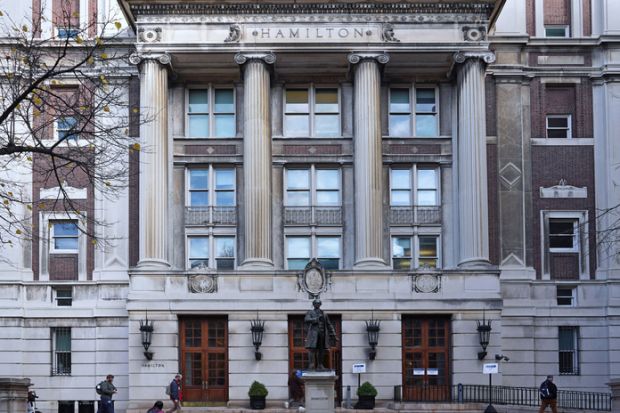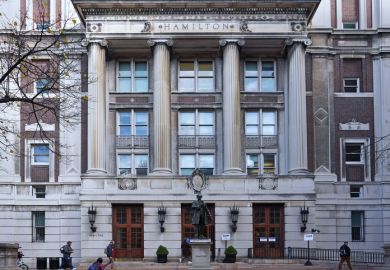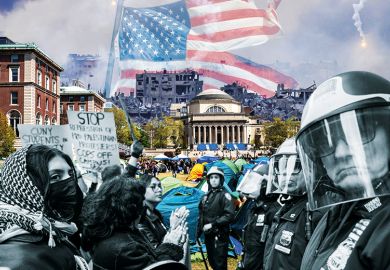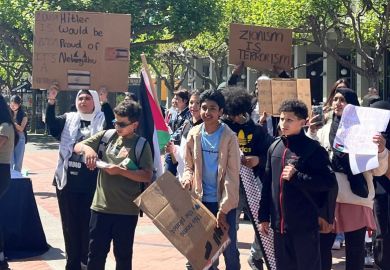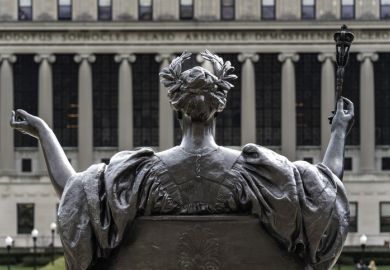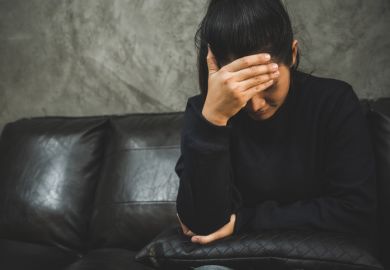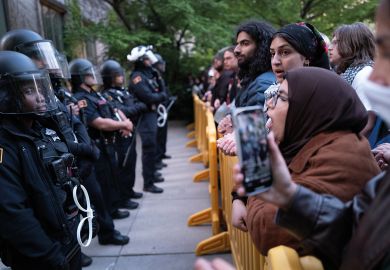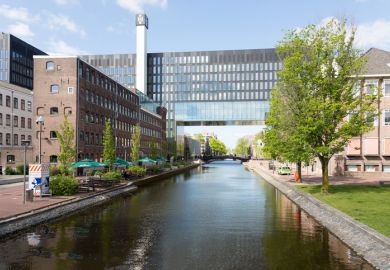Police have arrested dozens of pro-Palestinian protesters while clearing a Columbia University building that they had occupied, as violence also flared at the University of California, Los Angeles.
Scores of New York police officers in riot gear stormed Hamilton Hall, using a ladder to enter the second floor of the building, detaining demonstrators who had barricaded themselves inside after university leaders ended negotiations with a vow not to meet their demands for divestment from Israel and instead began suspension proceedings against students inside an encampment on the nearby South Lawn.
In a statement, Columbia said it had been “left with no choice” but to request the New York Police Department (NYPD) intervention after its premises were “occupied, vandalised and blockaded”. It said it believed that the occupation was “led by individuals who are not affiliated with the university”.
“The decision to reach out to the NYPD was in response to the actions of the protesters, not the cause they are championing. We have made it clear that the life of campus cannot be endlessly interrupted by protesters who violate the rules and the law,” a university spokesman said.
“Protesters chose to escalate to an alarming and untenable situation – including by vandalising property, breaking doors and windows, blockading entrances, and forcing our facilities and public safety workers out – and we are responding appropriately as we have long made clear we would. The safety of our community, especially our students, remains our top priority.”
The nearby tent camp was also understood to have been cleared. In a letter to NYPD deputy commissioner Michael Gerber, shared online, Columbia president Baroness Shafik asked officers to remain on campus for several weeks to prevent a recurrence of disruption.
The police action marked the culmination of two weeks of protests at Columbia, sparked by a congressional hearing in Washington DC where the Republican-led House of Representatives called in Lady Shafik as part of its months-long campaign to force US colleges and universities to punish expressions of pro-Palestinian sentiment.
The Columbia president authorised the police to make arrests as part of her bid to comply with the congressional demands. But Columbia students responded with a new sit-in protest on their campus’ main lawn, and students at institutions across the country followed suit.
The result has been a nationwide tally of nearly 1,000 arrests in police-led confrontations at institutions that include Columbia, Yale University, New York University, Princeton University, the University of Texas at Austin, Emerson College, Northeastern University, the University of Southern California, Ohio State University, Emory University, Indiana University, Arizona State University, the University of Minnesota and many more.
Shortly after the Columbia occupation was ended, violent clashes were reported at UCLA, where students have been holding their own lawn protests in recent days.
There were reports that masked pro-Israel demonstrators had attacked the encampment, and police were called to the scene. Footage shared on social media showed fireworks being set off and at least one being thrown into the camp, the Los Angeles Times reported.
“Horrific acts of violence occurred at the encampment tonight, and we immediately called law enforcement for mutual aid support. The fire department and medical personnel are on the scene. We are sickened by this senseless violence, and it must end,” said Mary Osako, UCLA’s vice-chancellor for strategic communications.
In a statement shared before the latest violence, UCLA chancellor Gene Block said that many demonstrators on both sides of the debate had been peaceful, but “the tactics of others have frankly been shocking and shameful”.
“UCLA supports peaceful protest, but not activism that harms our ability to carry out our academic mission and makes people in our community feel bullied, threatened and afraid. These incidents have put many on our campus, especially our Jewish students, in a state of anxiety and fear,” Professor Block said.
In response to the protests across the US, some universities have moved classes to online formats and cancelled commencement ceremonies. Many have moved to lock down their campuses, saying that protests that apparently originated with their students have since been joined by significant numbers of outside activists, raising the level of threat to their campus communities.
Student protesters in many locations have argued that their demonstrations have been peaceful and largely non-disruptive to their surroundings until institutional leaders ordered law enforcement involvement.
Register to continue
Why register?
- Registration is free and only takes a moment
- Once registered, you can read 3 articles a month
- Sign up for our newsletter
Subscribe
Or subscribe for unlimited access to:
- Unlimited access to news, views, insights & reviews
- Digital editions
- Digital access to THE’s university and college rankings analysis
Already registered or a current subscriber? Login
